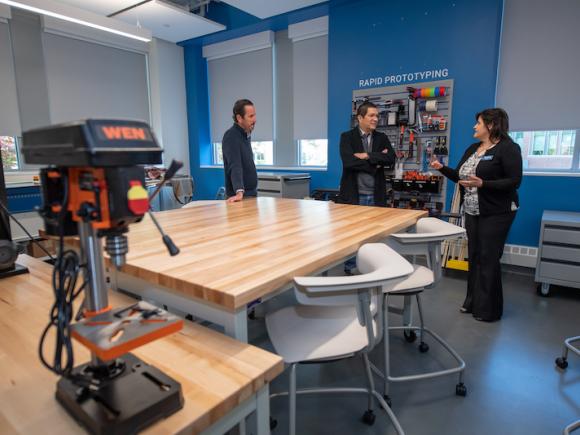
Whether you want to create, to teach, or to enhance your ability to appreciate art, you can earn your art degree through the study of visual arts, theory, concept, and practice. The visual arts program incorporates a curriculum consistent with College Art Association (C.A.A.) guidelines through the exploration of traditional and emerging mediums.
Choose from a variety of optional concentrations to customize your bachelor’s in art to meet both your personal interests and career goals. All concentrations share a common art major foundation program that leads into the concentration specializations in the final two years of study.
Available Optional Concentrations:
Animation
The Animation Concentration (18 additional credits) offers broad-based training in this field of art. You’ll be exposed to a wide range of contemporary and conventional techniques and learn about documentary animation, character animation, stop motion, digitally generated animation, and emerging animation technologies. This concentration culminates in a project consisting of an animated film as well as a portfolio presenting your professional and creative work in the field.
Art History
The Art History Concentration (18 additional credits) offers broad-based training in Western and Non-Western Art for those interested in a career in art criticism, museum work, or preparation for graduate study in Art History.
Art Therapy Preparation
As a mental health profession, art therapy counseling combines the therapeutic uses of art with the skills of a professional counselor to help heal and restore the functional and emotional health of clients of all ages. In this concentration, you’ll learn visual art, creative process, psychotherapy, human development, and counseling theories and techniques.
Art therapists are professional providers with at least a master's degree in art therapy or a master's degree with a concentration in art therapy. A bachelor's degree is required to get into an art therapy graduate program. The Art Therapy Preparation concentration at 91ĚŇÉ« meets all coursework and portfolio requirements necessary to gain admittance into a graduate program in Art Therapy.
Fine Arts
Designed for the art major who is interested in a career in fine arts or preparation for graduate school in studio art (MFA), the Fine Arts Concentration draws influence from various studio courses, drawing, and other art electives.
Illustration
For art majors interested in a career in illustration or preparation for graduate study in illustration, the Illustration Concentration (18 additional credits) offers broad-based training. You’ll learn how to research, develop, and create ideas relating to characters, stories, graphics, editorials, and settings into pictorial interpretations of ideas or narratives for reproduction in print, electronic, and time-based media.
Visual Arts Education Licensure (PreK-8 and 5-12)
91ĚŇɫ’s educator preparation programs are approved by the Massachusetts Department of Elementary and Secondary Education (DESE) and accredited by the Association for Advancing Quality in Educator Preparation (AAQEP). If you wish to become licensed to teach visual art, you must complete all the requirements of the art major as well as an additional 36-credit teacher preparation sequence for either Elementary (preK to 8) or Secondary (5-12) licensure.










